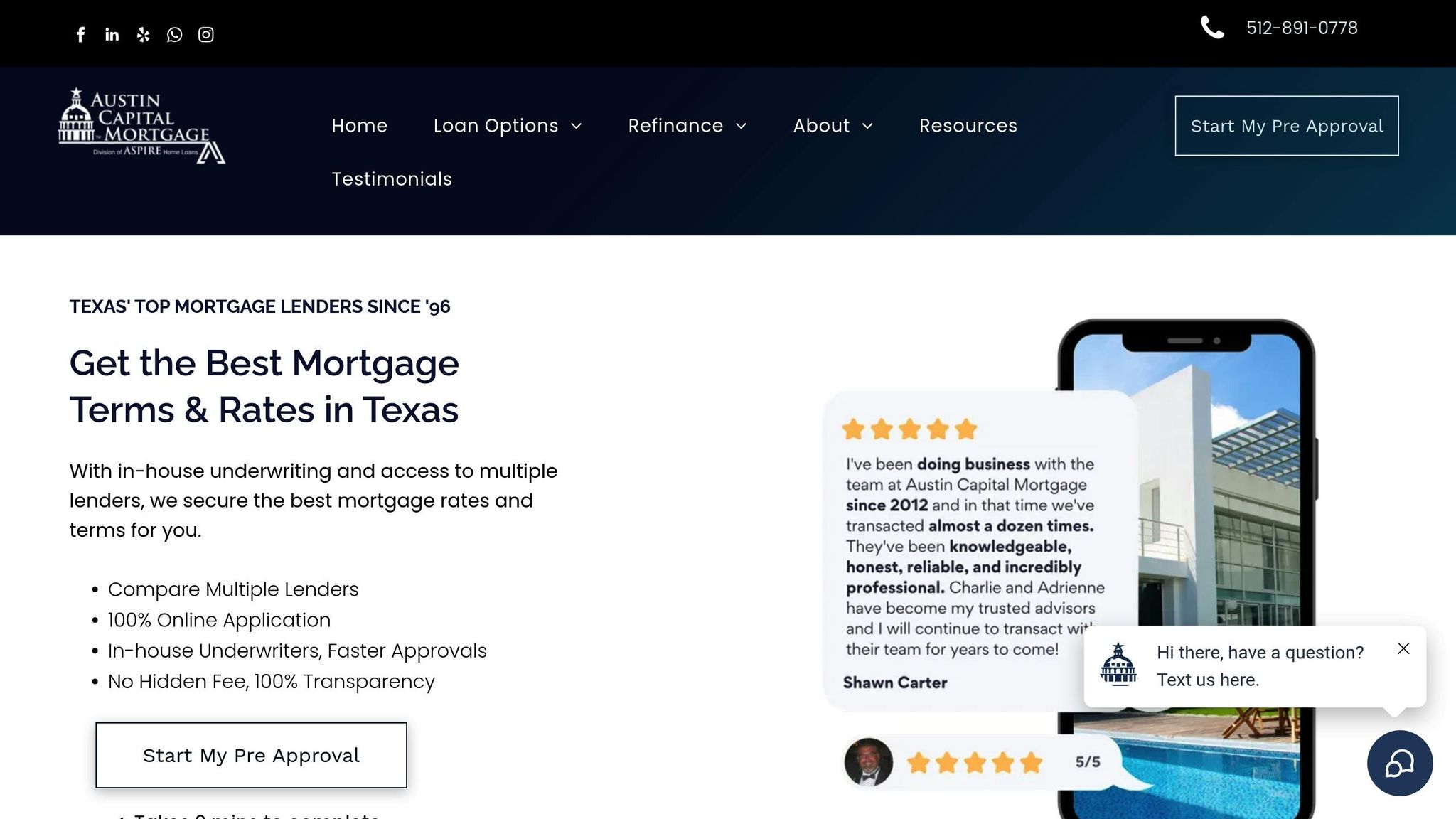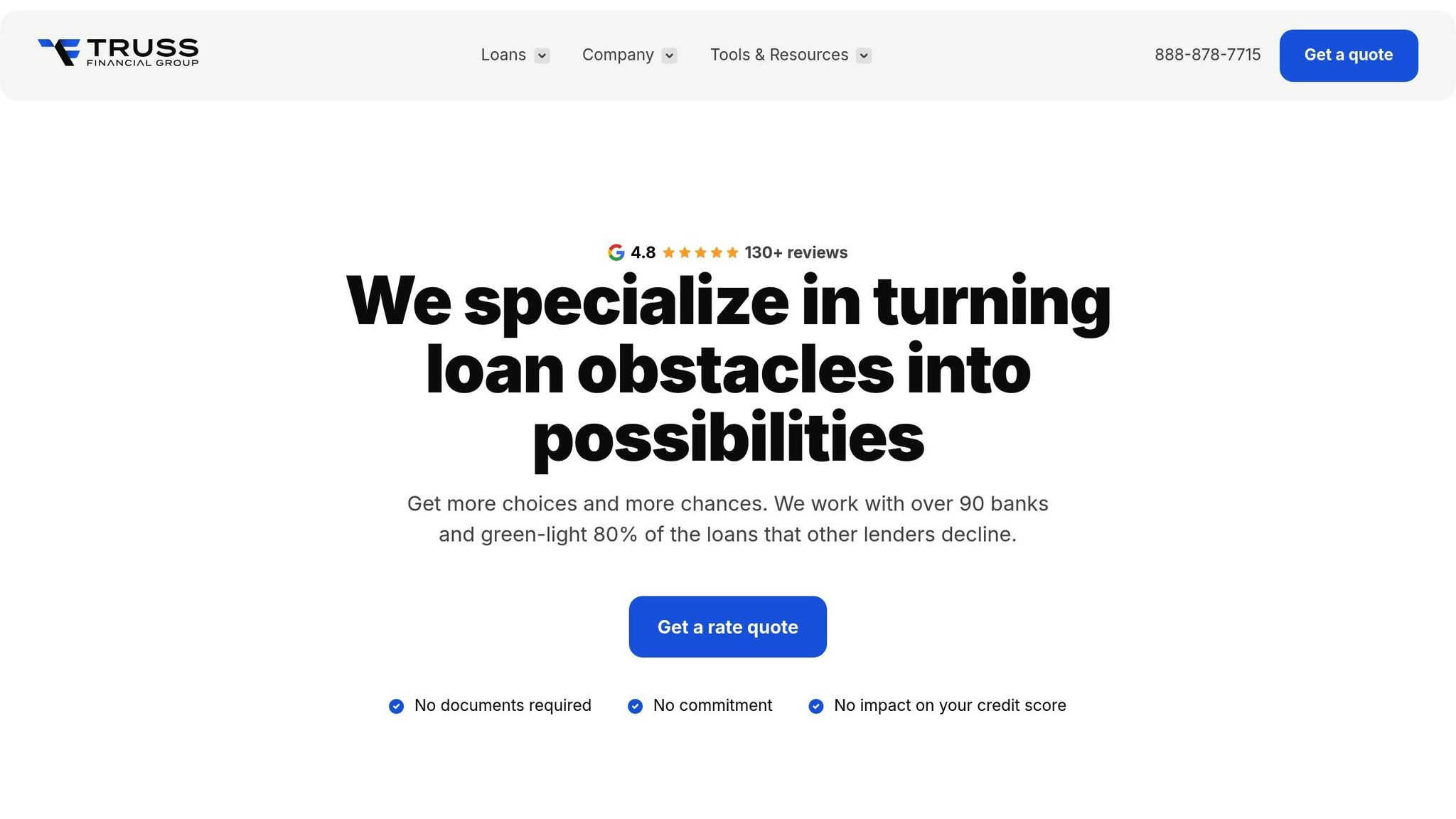Need a mortgage in Austin but self-employed? It’s challenging, but not impossible. Many lenders now offer flexible options for freelancers, business owners, and contractors. Here’s what you need to know:
- Documents Required: Tax returns (2 years), bank statements (12-24 months), profit and loss statements, and business licenses are essential.
- Loan Options:
- Conventional Loans: Require strong credit and steady income history.
- FHA Loans: Lower down payments, relaxed requirements.
- Non-QM Loans: Use bank statements instead of traditional income proof.
- Portfolio Loans: Customizable, but often need higher down payments.
Quick Comparison of Top Austin Lenders:
| Lender | Key Features | Best For |
|---|---|---|
| Austin Capital | Flexible documentation, competitive rates | Freelancers, contractors |
| Truss Financial | Stated income loans, high LTV options | Irregular income borrowers |
| SouthStar Bank | Portfolio loans for unique income | Non-traditional income earners |
| Union Square Mortgage | Bank statement programs | Business owners |
| TX Premier Mortgage | P&L-based programs, fast processing | Entrepreneurs |
How to Succeed:
- Gather all required documents in advance.
- Choose a lender experienced with self-employed borrowers.
- Highlight consistent income patterns and business stability.
By preparing thoroughly and selecting the right lender, you can navigate Austin’s competitive housing market with confidence.
What Self-Employed Borrowers Need to Know
Income Documentation You’ll Need
If you’re self-employed, be ready to provide detailed financial records. Lenders typically ask for documents that confirm both your personal income and your business’s financial health. Here’s what you’ll likely need:
- Personal tax returns from the last two years, including all schedules.
- Business tax returns for the same two-year period.
- A current year-to-date profit and loss statement, often prepared by a professional.
- Bank statements from the past 12 to 24 months for both personal and business accounts.
- A business license or similar proof showing at least two years of operation.
Some lenders may also accept additional documents, like 1099 forms, client contracts, or invoices, to verify your income. Once your financial records are in order, you can explore mortgage options that work for nontraditional income sources.
Mortgage Options for Self-Employed Borrowers
If you’re self-employed in Austin, there are several mortgage options that cater to alternative income verification:
- Conventional loans: These require strong credit and a well-documented income history. Most lenders prefer at least two years of consistent self-employment.
- FHA loans: These come with more flexible requirements and lower down payment options.
- Non-QM loans: Designed for borrowers who don’t meet traditional documentation standards, these loans may allow you to use bank statements as proof of income.
- Portfolio loans: Offered by certain lenders, these loans are held in-house and can be customized for unique financial situations. However, they often require a larger down payment.
Each option has its own criteria, so it’s important to choose one that aligns with your financial situation and long-term goals.
COMPLETE Guide to Self-Employed Mortgage Requirements …
5 Best Austin Lenders for Self-Employed Borrowers
Here are five lenders in Austin that provide mortgage solutions tailored for self-employed individuals.
Austin Capital Mortgage
This lender specializes in flexible documentation and alternative income verification, making it a solid choice for freelancers and contractors. They also offer competitive rates.
Truss Financial Group
Truss Financial Group offers stated income loans and high loan-to-value (LTV) options, which can be helpful for borrowers with inconsistent income streams.
SouthStar Bank
As a portfolio lender, SouthStar Bank provides custom programs for self-employed individuals with non-traditional income sources.
Union Square Mortgage
Union Square Mortgage simplifies the process for business owners by offering bank statement programs, eliminating the need for traditional tax returns.
TX Premier Mortgage
TX Premier Mortgage focuses on fast processing and P&L-based programs. They prioritize business profitability over standard income documentation, allowing for higher borrowing limits.
The table below highlights the key features and ideal borrower profiles for each lender:
| Lender | Key Features | Best For |
|---|---|---|
| Austin Capital Mortgage | Flexible documentation, Competitive rates | Freelancers and contractors |
| Truss Financial Group | Stated income loans, High LTV options | Borrowers with irregular income |
| SouthStar Bank | Portfolio lending for non-traditional income | Self-employed individuals with unconventional income |
| Union Square Mortgage | Bank statement programs | Business owners preferring alternative documentation |
| TX Premier Mortgage | P&L-based qualification, Fast processing | Entrepreneurs seeking streamlined financing |
These lenders cater to the unique needs of self-employed borrowers, offering programs that address challenges related to non-traditional income documentation. Their solutions open doors to homeownership for many in Austin’s self-employed community.
sbb-itb-4c99469
Lender Comparison Chart
Here’s a quick look at the loan types offered by top Austin lenders for self-employed borrowers:
| Lender | Loan Types Offered |
|---|---|
| Austin Capital Mortgage | Conventional, FHA, VA, Jumbo |
| Truss Financial Group | Conventional, Non-QM, Jumbo |
| SouthStar Bank | Portfolio Loans, Conventional, Jumbo |
| Union Square Mortgage | Bank Statement Loans, Conventional, FHA |
| TX Premier Mortgage | Conventional, Non-QM, VA |
Refer to this chart to find the lender that aligns with your financial situation and loan preferences.
How to Get Approved as a Self-Employed Borrower
To improve your chances of approval, you’ll need to gather specific documents that meet your lender’s requirements. Here’s a handy checklist:
| Document Type | Requirements | Notes |
|---|---|---|
| Tax Returns | Last 2 years (personal and business) | Include all schedules and K-1 forms |
| Bank Statements | Previous 12 months | Provide both personal and business accounts |
| Profit & Loss | Year-to-date statement | Should be professionally prepared |
| Business License | Current documentation | Include any relevant certifications |
| Insurance Proof | Current policies | Cover both business liability and property |
| Asset Statements | Last 2 months | Include investment and retirement accounts |
Once you’ve gathered everything, double-check your documents for accuracy. This will help streamline the approval process and avoid delays. Keep reading for more tips to secure pre-approval.
Conclusion
The lender profiles and tips provided here aim to help self-employed borrowers navigate Austin’s mortgage market effectively. Success often comes down to preparation and working with lenders familiar with nontraditional income sources.
Having complete and accurate financial records is key when applying for a mortgage. Local lenders with experience in self-employed mortgages often offer more flexible underwriting options and have a better understanding of Austin’s market.
Show consistent income patterns and keep your business documentation organized and up to date. Partnering with lenders who specialize in self-employed borrowers can improve your chances of getting favorable loan terms.
Austin’s market continues to change, making it important to work with local lenders offering competitive and tailored programs. Compare multiple lenders and focus on those with a track record of serving Austin’s entrepreneurial community. With careful preparation and smart lender selection, you’ll be well-positioned to secure the right mortgage.










